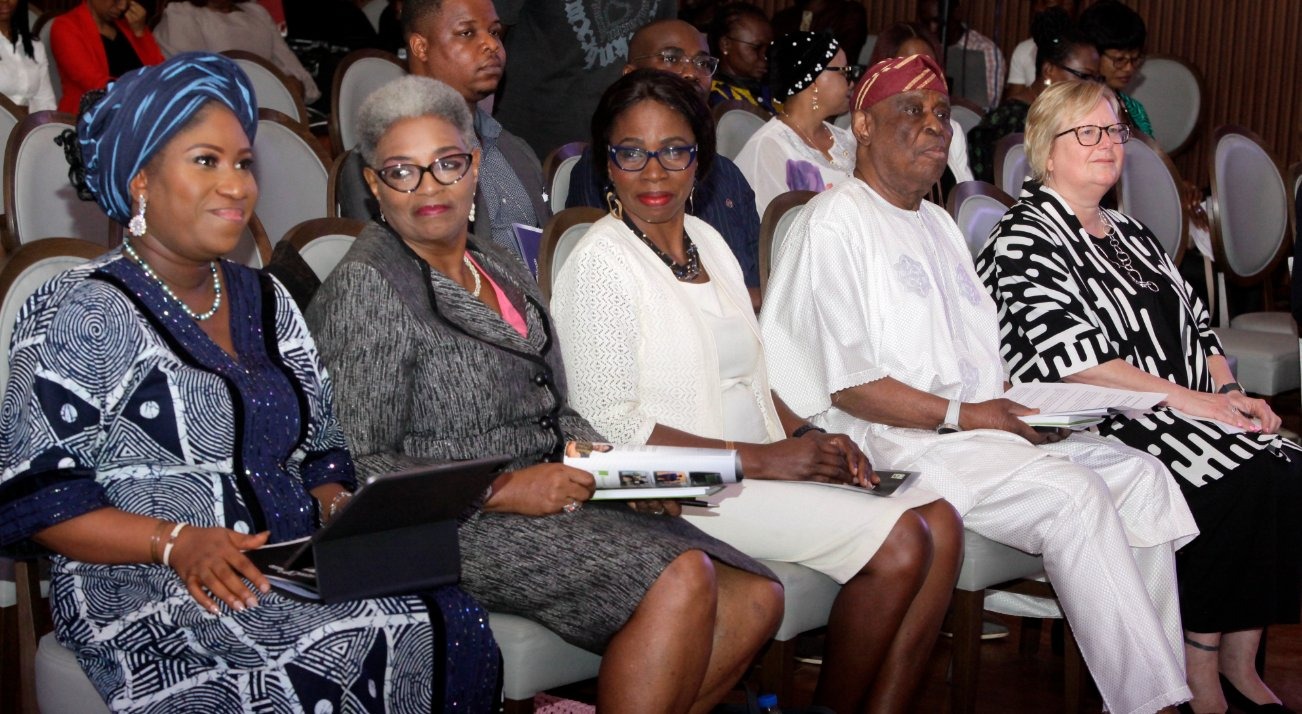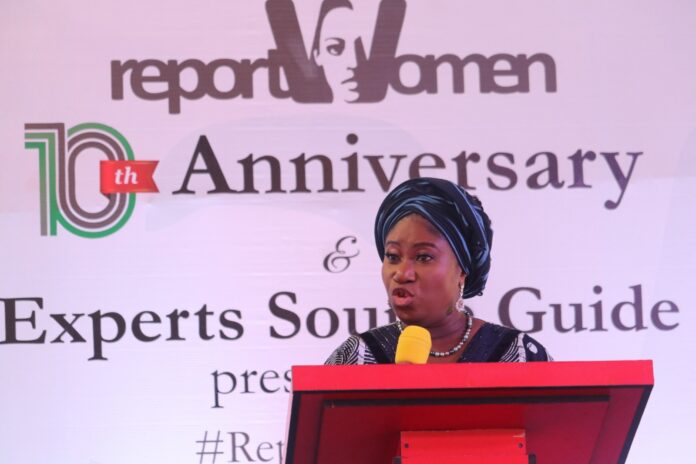By Habeeb Ibrahim
The Wole Soyinka Centre for Investigative Journalism (WSCIJ) marked the 10th anniversary of its “Report Women” initiative in a grand event that celebrated a decade of amplifying the voices of women in the media.

The event, held in Lagos, brought together media professionals, government officials, diplomats, campus journalists and other stakeholders committed to advancing gender equality in journalism.
Motunrayo Alaka, Executive Director/CEO of WSCIJ, opened the event by emphasizing the importance of the day. She highlighted the journey of the Report Women! programme, which began in 2014 with a mission to address the lack of quality news coverage on issues affecting women and girls.
Over the past ten years, the initiative has trained 80 reporters, produced groundbreaking research, published investigative documentaries, and created platforms for women to lead conversations on media representation.
“We are proud to present what we believe will be one of our many gifts to journalism and the society it serves — a female expert source guide,” Alaka announced. The guide features over 500 female authorities across eight sectors, including politics, governance, media, business, law, and health.
This resource is aimed at bridging the gap in the representation of women as expert sources in the news.
The programme’s impact has been wide-reaching, as seen through the Female Reporters Leadership Programme (FRLP), launched in 2017. The fellowship has trained and mentored 86 female journalists, who have gone on to produce 136 stories and positively impacted over 2,900 direct beneficiaries.
Alaka acknowledged the invaluable support of partners such as the Netherlands Embassy, Free Press Unlimited (FPU), Open Society Initiative for West Africa (OSIWA), and the Bill & Melinda Gates Foundation.
Dickens Olewe, Programme Officer of the Bill & Melinda Gates Foundation, also delivered remarks, congratulating WSCIJ on its milestone. “Your passion and clarity in addressing the importance of your work are truly inspiring,” he said. Olewe praised the fellowship for empowering women journalists and creating opportunities for them to take leadership roles in their newsrooms. “I’m optimistic about the next decade. With your established reputation, industry ownership, and expertise, I have no doubt you’ll continue to drive positive change,” he added.
In a keynote address, Olusegun Osoba, former governor of Ogun State and chairperson of the event, spoke passionately about the role of journalists in society.
He praised the WSCIJ for holding the media accountable for fair representation and human rights advocacy. “For too long, we have overlooked the voices and leadership of women,” Osoba said. “We cannot tell the story of our nation or fight the battles of injustice and corruption if we silence half of our population.”
Osoba, a veteran journalist himself, emphasized the need for more inclusive journalism, pointing out that the Report Women! initiative has been pivotal in challenging the male-dominated media landscape.
Goodwill messages were also delivered by notable figures, including Chris Isiguzo, President of the Nigerian Union of Journalists (NUJ), and Eze Anaba, President of the Nigerian Guild of Editors, represented by Kabiru Alabi, Vice President (West) of the Guild. Both leaders lauded the WSCIJ for its dedication to promoting gender equity in media and pledged continued support for the initiative.
Isiguzo acknowledged the transformative impact of the Report Women Experts Platform, which provides media practitioners with easy access to female experts in various fields. He noted that the initiative has reshaped narratives around women and girls in Nigeria, ensuring that they are no longer underrepresented in news coverage.
Kabiru Alabi, on behalf of the Nigerian Guild of Editors, called for a renewed commitment to inclusive reporting. “When reporting on women, we must portray them as leaders, innovators, and change-makers,” Alabi stated. He urged journalists to take responsibility for shaping positive narratives that inspire the next generation of women leaders.
Julie McKay, Public Affairs Officer of the U.S. Consulate, commended WSCIJ for its continued efforts to promote gender balance in media representation. She spoke about the U.S. government’s initiatives aimed at removing barriers to women’s participation, including exchange programs and mentorship opportunities. “Gender balance in newsrooms and reporting is essential worldwide,” McKay said, noting that even in the United States, there are still challenges in achieving gender parity in media.
Professor Chinyere Okonna, Nigeria’s first female professor of Mass Communication and an advocate for gender equality, also delivered a powerful message. She highlighted the persistent underrepresentation of women in the media and stressed the importance of initiatives like the WSCIJ’s expert guide. “The excuse that women experts are unknown is no longer valid,” she said. “The Wole Soyinka Centre’s campaign to compile a database of women experts has made sure of that.”
Okonna called on younger women in journalism to be relentless in breaking down barriers and urged media houses to provide more opportunities for female journalists to lead. She emphasized the need for role models and mentorship for the next generation of women in media.
Michel Deleen, Consul General of the Netherlands, also delivered a goodwill message, expressing admiration for the WSCIJ’s work in advancing women’s roles in journalism. He commended the center for its high-quality training programs and the risks taken by many female journalists in their pursuit of truth.
As the WSCIJ embarks on the next decade, Alaka expressed optimism for the future, calling on stakeholders to continue supporting the cause of gender equality in media. “Come with us to a future where the face and voice of newsrooms, news, and society’s leadership are as female as they are currently male,” she concluded.








